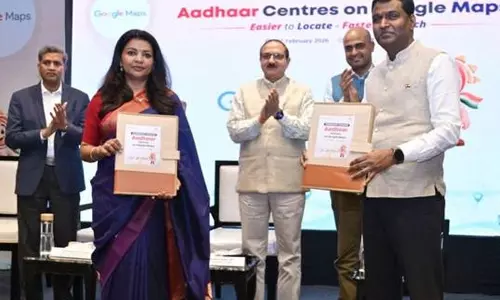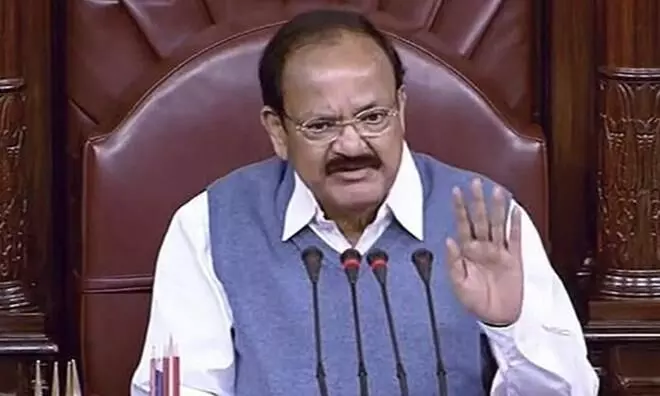
Making democracy invisible
text_fieldsRajya Sabha Chairman M. Venkaiah Naidu, Image credit: PTI
The scenes in Indian parliament during the past few days are largely a commentary of the extent to which Fascism' chariot race has driven the country. The monsoon session that ended on Wednesday displayed a picture in which the ruling party, on the back of its brute majority, reduced the sacred spot of world's largest democracy into its own confines and turned it into a mute spectator. Using the Covid restrictions, not only did the government truncate the session and its key routine items, but the BJP also pushed through laws that the party wished to, for furthering its own interests. On a single day, within three and a half hours, the BJP got passed seven bills that have grave implications for the key sectors of the country's economy, farming and labour. Six of them, which strip the farmers and labourers of much of their freedom and rights, and are weighted heavily in favour of the employer class, were passed by voice vote in front of empty opposition benches. They have since been sent for the President's assent. One bill was sent back to the Lok Sabha for discussion, on the satirically stated grounds of having more transparency. The suspension of eight MP's who had protested the Rajya Sabha Speaker's act of denying voting and thus flouting constitutional principles and parliamentary rules of proceedings, and the Opposition's subsequent boycott of parliament, were taken as a convenience for the smooth sailing of legislation by the treasury bench.
Legislative houses are open forums of democracy for healthy exchange of views, debates, responses and protests. They are the houses of debate to which the electorate vote and send leaders from different parties, based on their pledge to the welfare of the country and people. The so elected representatives have a primary responsibility thence to reflect the views and perceptions of the constituencies they represent, and who elect them based on their political persuasions and commitments. And the rules of the house and proceedings are designed in such a way as to give room for that. Naturally, the nation envisions that the shining moments of a house are born when it gives space to the voice of the minority, not merely to the presumed infallibility of the treasury bench. But what happened in the Lok Sabha and Rajya Sabha in the recent days is everything that one would expect from a fascist machinery - which works on the premise that minority and minority voices are to be shunned and eliminated. The distinguishing feature of fascism is to run roughshod over counter-voices and to make them invisible. The Hindutva party of India is treading the same path without deviating a bit. And in that process there is no room for any racial, political or cultural distinction: Dalit-Muslim-Christian backward minorities get equally trampled in this process. That is exactly the model that was in display in parliament too. The sangh parivar slogans of 'if you are with us, we are with you, if you are not there, without you, and if you oppose, we march forward setting you aside' are still there intact on many of our walls. It was a blatant manifestation of this idea that we saw in Rajya Sabha in the last few days.
The practice of issuing ordinances is resorted to when a matter is so urgent that it cannot brook delay upto the next legislative session. But after the previous parliament session, Modi government issued 11 ordinances. There is also the house courtesy of referring a subject to study by a select committee, when a proposal faces serious opposition on core issues. When the agrarian bills invited the opposition from not only the opposition parties including the Congress and left parties, but also regional ruling coalition partners like Shiromani Akali Dal, Biju Janata Dal and TRS, in addition to regional groups like Trinamool Congress and DMK, such a step or reference would have helped the government make effective confabulations with people from a broad spectrum of opinions. But the central government did not budge, on which the Opposition demanded voting in Rajya Sabha. While rules of the house dictate that voting is to be arranged even if a solo member demands it, what the chairman did was to reject the opposition demand and declare victory for the ruling party. The heated reaction to this step by the opposition members, albeit in a far from edifying manner and caused by the frustration over the chairman's decision, led to the suspension of eight members from the house. But then who will give, what punishment to the Hindutva government that puts an entire parliament itself in suspension, and it exists only to let the ruling party's writ rule the day. By making even the protests of the opposition an opportunity to pass black laws, the message sent out by the sangh parivar government - on the strength of majority hegemony - is that it will not hesitate to make democracy itself invisible.






















